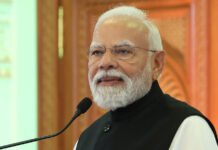INVC NEWS
New Delhi – The issue of stubble burning has emerged as a significant environmental challenge in India, especially in states like Punjab and Haryana. Recently, Punjab’s Chief Minister Bhagwant Mann posed a thought-provoking question: if Prime Minister Narendra Modi can influence global matters like the Ukraine war, why can’t he address the critical problem of stubble burning? This inquiry has ignited discussions around government accountability, agricultural practices, and environmental sustainability.
Understanding the Stubble Burning Crisis
Stubble burning is a practice where farmers set fire to the leftover straw after harvesting crops, primarily rice. This method, while economically expedient for farmers looking to prepare their fields quickly for the next crop, has dire environmental implications. The resultant smoke contributes to severe air pollution, particularly affecting the air quality in North India and cities like Delhi. The consequences extend beyond immediate pollution; they pose long-term health risks to populations and affect agricultural productivity.
Why Farmers Resort to Stubble Burning
Farmers in Punjab often feel compelled to burn stubble due to a combination of factors:
- Economic Constraints: Many farmers lack access to modern agricultural practices and technologies that could help manage crop residue effectively. Additionally, the Minimum Support Price (MSP) for alternative crops is often insufficient, making rice the preferred choice despite its detrimental aftermath.
- Time Pressures: After the rice harvest, farmers have a narrow window to prepare for the next sowing season. This urgency often leads them to resort to burning the stubble, viewing it as the quickest solution.
- Lack of Awareness and Resources: Although the negative impact of stubble burning is well-documented, many farmers may not be fully aware of the alternatives available to them or may lack the necessary resources to implement these solutions.
Bhagwant Mann’s Call for Action
Chief Minister Bhagwant Mann’s remarks underscore a broader concern regarding the government’s approach to environmental issues. He emphasized that stubble burning is not just a Punjab issue; it affects the entirety of North India. His proposition that Prime Minister Modi should convene discussions among state leaders reflects a need for collective action and support. Here are some key points from his statement:
- Compensation for Farmers: Mann argued that the central government should provide compensation to farmers as a practical solution to mitigate stubble burning. Such support could encourage farmers to explore alternative practices rather than relying on burning.
- Scientific Collaboration: The involvement of scientists in devising effective methods for managing crop residues is crucial. By leveraging scientific knowledge and innovation, sustainable practices can be developed that are viable for farmers.
- Addressing Systemic Issues: Mann highlighted that the problem of stubble burning is symptomatic of larger systemic issues within the agricultural sector, including the need for policies that support sustainable farming and crop diversification.
The Role of State Governments
State governments play a crucial role in addressing the stubble burning crisis. Haryana’s Chief Minister Nayab Saini also made a notable statement regarding farmers accused of burning stubble. Saini declared that no criminal charges would be filed against these farmers, alleviating fears of legal repercussions that could further burden their livelihoods. This approach can foster a more supportive environment for farmers to adopt better practices without the fear of penalties.















